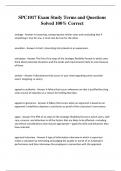SPC1017 Exam Study Terms and Questions
Solved 100% Correct
analogy - Answer In reasoning, comparing two similar cases and concluding that if
something is true for one, it must also be true for the other.
anecdote - Answer A short, interesting story based on an experience.
anticipate - Answer The first of six steps of the strategic flexibility format in which users
think about potential situations and the needs and requirements likely to arise because
of them.
anxiety - Answer A disturbance that occurs in your mind regarding some uncertain
event, misgiving, or worry.
appeal to authority - Answer A fallacy that occurs whenever an idea is justified by citing
some source of expertise as a reason for holding that idea.
appeal to ignorance - Answer A fallacy that occurs when an argument is based on an
opponent's inability to disprove a conclusion as proof of the conclusion's correctness.
apply - Answer The fifth of six steps of the strategic flexibility format in which users, with
care, concern, and attention to all the factors that are likely to be affected—including
any ethical considerations that may be appropriate—apply the skills and behaviors they
have selected.
appraisal interview - Answer A type of information interview in which a supervisor
makes a valuation by estimating and judging the quality or worth of an employee's
performance and then interviews the employee in connection with the appraisal.
,Appreciative listening - Answer To listen for pleasure.
articulation - Answer The ability to pronounce the letters in a word correctly.
assertiveness - Answer Taking the responsibility of expressing needs, thoughts, and
feelings in a direct, clear manner.
assess - Answer The second of the six steps of the strategic flexibility format in which
users take stock of the factors, elements, and conditions of the situations in which you
find yourself.
assimilation - Answer When nondominants use assimilation, they drop cultural
differences and distinctive characteristics that would identify them with the
nondominant group.
assimilation strategies - Answer When people are not part of a dominant culture, those
processes they use to drop cultural differences and distinctive characteristics that would
identify them with the nondominant group include the use of nonassertive, assertive,
and aggressive assimilation strategies.
assumption - Answer A taking for granted or supposition that something is a fact.
asynchronous communication - Answer Communication in which people are not directly
connected with each other at the same time.
attentiveness - Answer Focusing on the moment.
,attitudes - Answer Deeply felt beliefs that govern how one behaves. Also, a group of
beliefs that cause us to respond in some way to a particular object or situation.
abstract symbol - Answer A symbol that represents an idea.
accent - Answer Nonverbal message designed specifically to place stress on the verbal
message.
access to roles - Answer A characteristic of the Internet that makes it unique from
normal face-to-face communication because there are no limitations; whoever has the
technical capacity to receive messages with a computer can also send them.
accommodation - Answer An approach that works toward getting the dominant group
to reinvent, or at least change, the rules so that they incorporate the life experiences of
the nondominant group. Something that occurs in groups when people on one side of
an issue give in to the other side.
accommodation strategies - Answer When people are not part of a dominant culture,
those processes people use to get the dominant group to reinvent or change the rules
through the use of nonassertive, assertive, or aggressive accommodation.
action listening style - Answer That kind of listening in which the listener wants precise,
error-free presentations and is likely to be impatient with disorganization.
active listening - Answer Making a mental outline of important points, thinking up
questions or challenges to the points that have been made, and becoming mentally
involved with the person talking.
adaptors - Answer Nonverbal ways of adjusting to a communication situation.
, ad hominem - Answer A fallacy that occurs when an argument diverts attention away
from the question being argued by focusing instead on those arguing it.
agenda - Answer A list of all the items that will be discussed during a meeting.
aggressive talk - Answer Talk that attacks a person's self-concept with the intent of
inflicting psychological pain.
attractiveness - Answer Having the power or quality of drawing, pleasing, or winning.
audience analysis - Answer Finding out what one's audience members know about a
subject, what they might be interested in, and what their attitudes and beliefs are.
authoritarian leader - Answer One who holds great control over a group.
avoidance - Answer A refusal to deal with conflict or painful issues.
begging the question - Answer A fallacy that occurs when an argument, instead of
offering proof for its conclusion, simply reasserts the conclusion in another form.
beliefs - Answer One's own convictions; what one thinks is right and wrong, true and
false. Also, they are classified as statements of knowledge, opinion, and faith.
bid - Answer A question, gesture, look, touch, or other single expression that says, "I
want to feel connected to you."
bifurcation - Answer A fallacy that occurs when one presumes that a distinction is
exclusive and exhaustive, but other alternatives exist.




